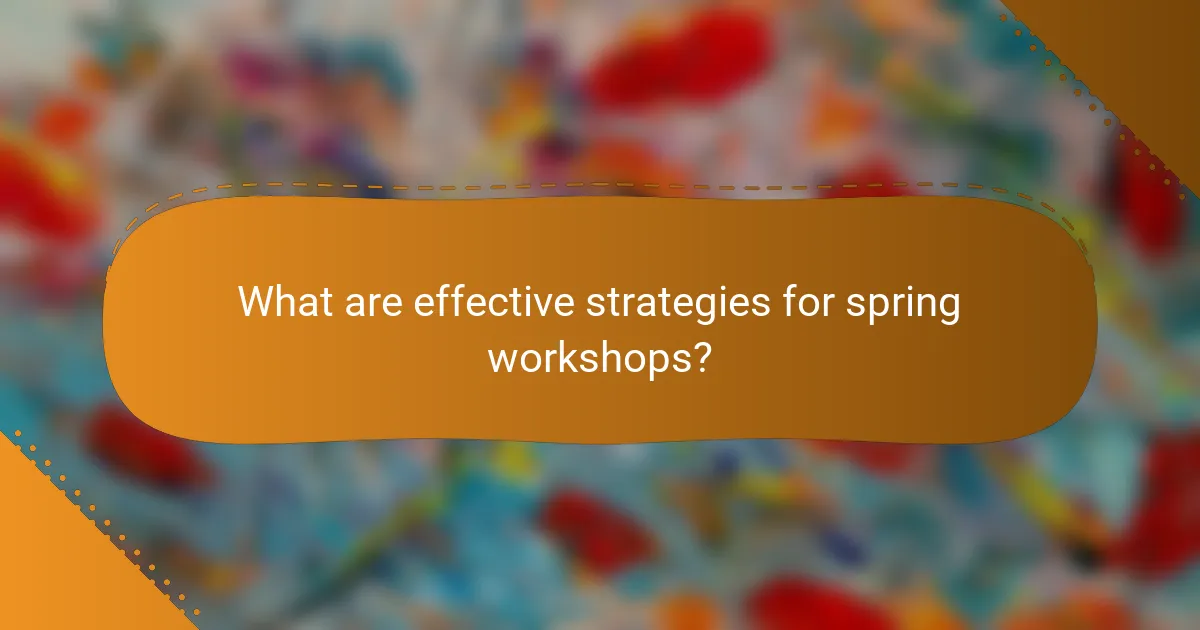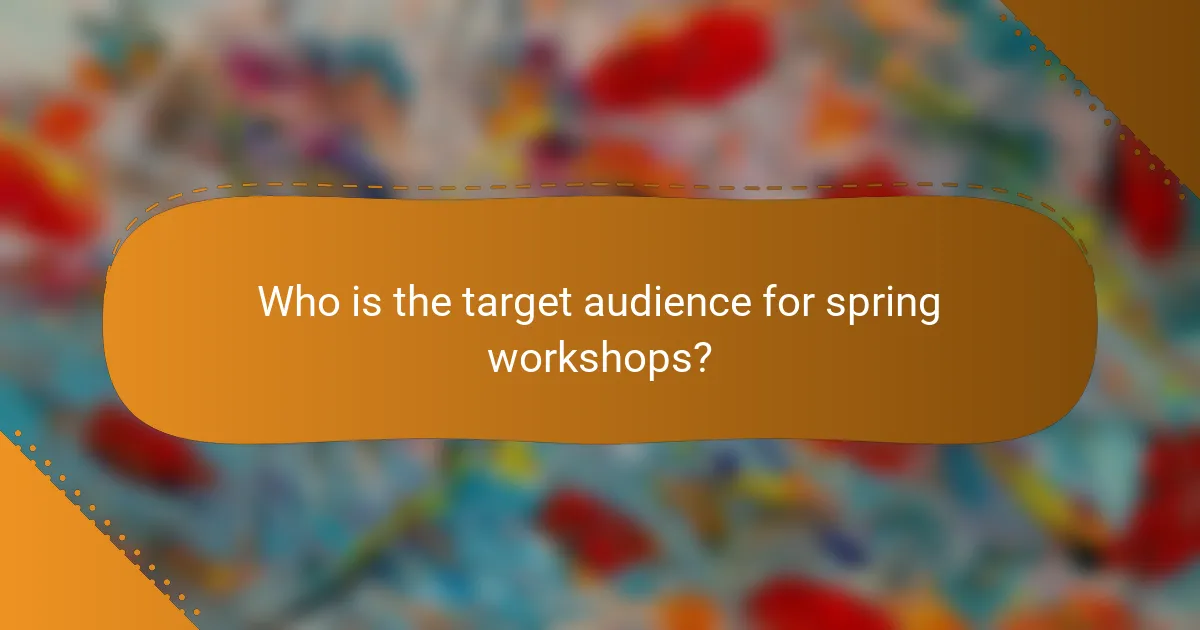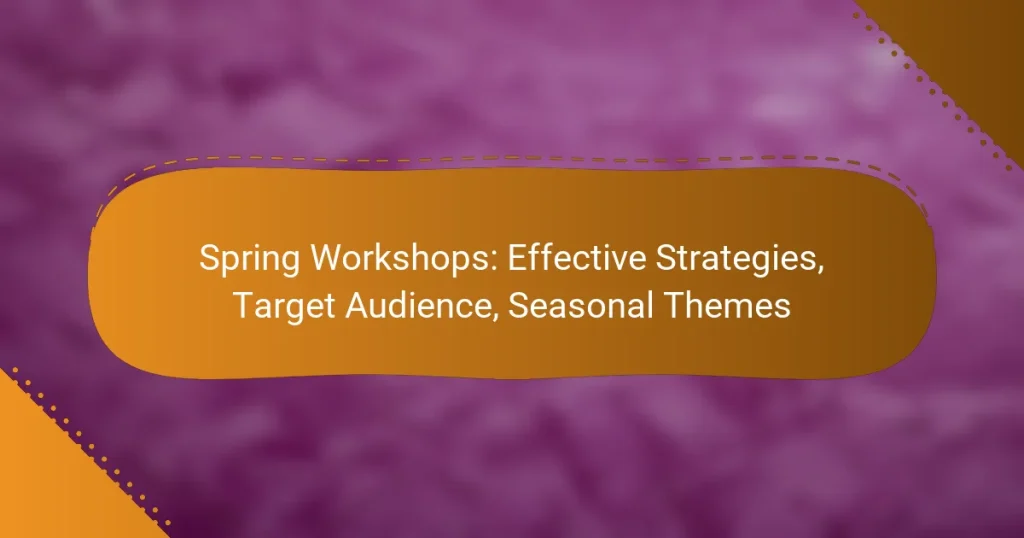Spring workshops offer a unique opportunity to engage participants through effective strategies such as interactive activities and guest speakers. Tailoring content to the needs of local community members, small business owners, and students can enhance relevance and impact. By incorporating seasonal themes like gardening and creativity, these workshops can attract a diverse audience and foster memorable learning experiences.

What are effective strategies for spring workshops?
Effective strategies for spring workshops include incorporating interactive activities, inviting guest speakers, and focusing on hands-on learning. These elements engage participants and enhance the overall experience, making workshops more memorable and impactful.
Interactive activities
Interactive activities are essential for keeping participants engaged during spring workshops. Consider using group discussions, role-playing, or problem-solving tasks that encourage collaboration. These activities not only foster a sense of community but also enhance learning retention.
When planning interactive elements, ensure they are relevant to the workshop’s theme and objectives. For example, if the workshop focuses on gardening, participants could work in teams to design a small garden layout.
Guest speakers
Inviting guest speakers can significantly enrich the content of spring workshops. Experts in relevant fields can provide unique insights and inspire participants with their experiences. Aim to select speakers who resonate with your target audience and can address current trends or challenges in the industry.
To maximize engagement, consider a Q&A session after the speaker’s presentation. This allows participants to interact directly and clarify any doubts, making the experience more valuable.
Hands-on learning
Hands-on learning is a powerful strategy for spring workshops, as it allows participants to apply concepts in real-time. Incorporate practical exercises, such as crafting, cooking, or technical skills, depending on the workshop’s focus. This approach helps solidify knowledge and boosts confidence in applying new skills.
Ensure that materials and resources are readily available for participants. For instance, if the workshop involves DIY projects, provide all necessary tools and supplies to facilitate a smooth learning experience.
Networking opportunities
Creating networking opportunities is crucial for participants to connect and build relationships during spring workshops. Allocate time for informal discussions, breakout sessions, or social events where attendees can mingle and share experiences. This fosters collaboration and can lead to future partnerships.
Consider using icebreaker activities to encourage interaction among participants. Simple games or prompts can help break down barriers and make networking more comfortable.
Seasonal themes integration
Integrating seasonal themes into spring workshops can enhance relevance and engagement. Use elements of spring, such as renewal and growth, to frame discussions and activities. This thematic approach can make the workshop feel timely and connected to participants’ experiences.
For example, if the workshop focuses on personal development, you might incorporate activities that encourage participants to set new goals or reflect on their growth. Aligning content with the season can create a more cohesive and enjoyable experience.

Who is the target audience for spring workshops?
The target audience for spring workshops typically includes local community members, small business owners, and students and educators. Each group has distinct needs and interests that can be addressed through tailored workshop content and activities.
Local community members
Local community members often seek workshops that enhance their skills or provide new hobbies. These workshops can cover topics like gardening, cooking, or arts and crafts, which resonate well during the spring season.
When planning workshops for this audience, consider their interests and availability. Evening or weekend sessions may attract more participants, and offering materials or resources can enhance their experience.
Small business owners
Small business owners are interested in workshops that focus on growth strategies, marketing techniques, and seasonal trends. Spring workshops can provide insights into effective marketing campaigns that leverage the season’s themes, such as outdoor events or spring sales.
To engage this audience, consider including case studies or success stories from local businesses. Networking opportunities during the workshops can also be beneficial, allowing participants to connect and collaborate.
Students and educators
Students and educators often look for workshops that complement academic learning or provide practical skills. Workshops on topics like environmental science, sustainability, or creative writing can be particularly appealing in the spring.
When designing workshops for this group, align content with curriculum standards and consider offering certifications or credits. Engaging activities that encourage collaboration and creativity can enhance learning outcomes and participation.

What seasonal themes can enhance spring workshops?
Seasonal themes for spring workshops can significantly boost engagement and relevance. Incorporating topics that resonate with the season, such as gardening, health, and creativity, can attract a diverse audience and create memorable experiences.
Gardening and sustainability
Gardening and sustainability workshops can inspire participants to cultivate their green thumbs while promoting eco-friendly practices. These sessions can cover topics like organic gardening, composting, and native plant cultivation, appealing to both novices and seasoned gardeners.
Consider offering hands-on activities, such as planting seeds or creating small garden beds. Local community gardens or parks can serve as excellent venues, providing participants with practical experience and a connection to their environment.
Health and wellness
Health and wellness workshops during spring can focus on rejuvenation and self-care as the weather warms up. Topics may include nutrition, mindfulness, yoga, and outdoor fitness activities, encouraging participants to embrace a healthier lifestyle.
Incorporate interactive elements, such as guided meditation sessions or group workouts in a park. Collaborating with local health professionals can enhance credibility and provide valuable insights tailored to the community’s needs.
Creative arts and crafts
Creative arts and crafts workshops can tap into the vibrant energy of spring, allowing participants to express themselves through various mediums. Popular activities might include painting, pottery, or floral arrangements, fostering creativity and relaxation.
To maximize engagement, consider offering themed projects that reflect the season, such as creating spring-inspired decorations or nature-based art. Local art studios or community centers can be ideal locations for these workshops, providing necessary materials and a supportive environment.

How to promote spring workshops effectively?
To promote spring workshops effectively, focus on targeted outreach strategies that resonate with your audience. Utilize social media, email campaigns, and partnerships with local businesses to maximize visibility and engagement.
Social media marketing
Social media marketing is crucial for reaching a broad audience quickly. Platforms like Facebook, Instagram, and Twitter allow you to share engaging content, such as workshop highlights, testimonials, and seasonal themes that attract participants.
Consider using targeted ads to reach specific demographics, such as age groups or interests relevant to your workshops. Regularly post updates and encourage shares to increase organic reach.
Email campaigns
Email campaigns are an effective way to directly communicate with potential attendees. Create a segmented email list to tailor your messages based on interests or past participation, ensuring higher engagement rates.
Include clear calls to action, such as registration links and early bird discounts, to incentivize sign-ups. Aim for a frequency of one to two emails per month leading up to the workshops to keep your audience informed without overwhelming them.
Partnerships with local businesses
Forming partnerships with local businesses can enhance your workshop’s visibility and credibility. Collaborate with companies that share a similar target audience, such as cafes, bookstores, or fitness centers, to cross-promote events.
Consider offering exclusive discounts to customers of your partners or hosting joint events to attract a wider audience. This not only boosts attendance but also fosters community engagement and support.

What are the prerequisites for hosting a successful workshop?
To host a successful workshop, you need to consider several key factors including venue selection, budget planning, and marketing strategy. Each of these elements plays a crucial role in ensuring that your workshop meets its objectives and attracts the right audience.
Venue selection
Selecting the right venue is essential for creating an engaging workshop environment. Consider factors such as location, capacity, accessibility, and amenities. A venue that is easily reachable by public transport or has ample parking can significantly increase attendance.
Evaluate different types of venues, from community centers to conference halls, based on your target audience’s preferences. For instance, a creative workshop might benefit from an inspiring space like an art studio, while a corporate training session may require a more formal setting.
Budget planning
Effective budget planning is critical for the overall success of your workshop. Start by estimating costs for the venue, materials, catering, and marketing. Aim to allocate funds wisely to avoid overspending while still delivering a quality experience.
Consider potential revenue sources, such as ticket sales or sponsorships, to offset costs. A well-structured budget will help you identify financial gaps and ensure that your workshop remains profitable.
Marketing strategy
A strong marketing strategy is vital for attracting participants to your workshop. Utilize various channels such as social media, email newsletters, and local community boards to promote your event. Tailor your messaging to resonate with your target audience and highlight the unique benefits of attending.
Engage with potential attendees through early bird discounts or referral incentives. Tracking engagement metrics can help you refine your approach and maximize attendance leading up to the event.

What criteria should be used to select workshop topics?
Selecting workshop topics requires a focus on audience needs, current trends, and seasonal relevance. Effective criteria include understanding participant interests, aligning with seasonal themes, and ensuring the topics are actionable and engaging.
Audience interest
Understanding audience interest is crucial for selecting relevant workshop topics. Conduct surveys or polls to gauge what potential participants are eager to learn. This direct feedback can guide your topic selection and increase attendance.
Consider demographic factors such as age, profession, and experience level. For instance, a workshop aimed at beginners may focus on foundational skills, while advanced sessions can delve into specialized techniques. Tailoring content to the audience’s interests ensures higher engagement and satisfaction.
Utilize social media and community forums to identify trending topics within your target audience. Observing discussions and popular content can provide insights into what themes resonate most, helping you craft workshops that are both timely and appealing.


